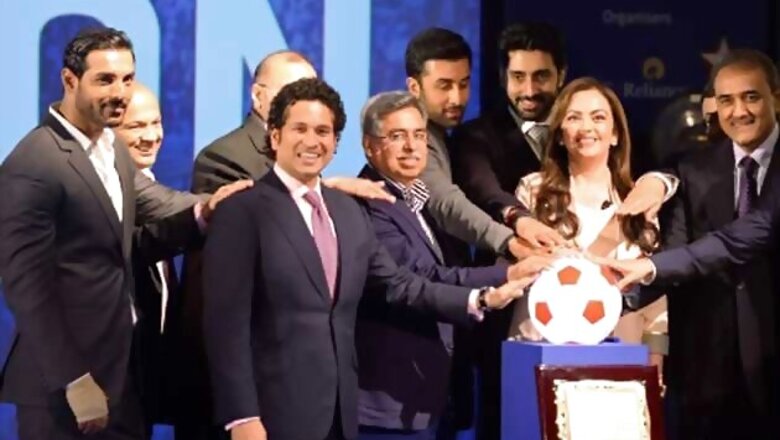
views
New Delhi: Despite the presence of veteran football stars Alessandro Del Piero, Robert Pires, Luis Garcia, David Trezeguet and Nicholas Anelka, the inaugural Indian Super League is selling itself using top cricketers.
The pecking order of Indian sports is underlined by the ISL's decision to market its high-profile stakeholders; India cricket captain Mahendra Singh Dhoni partly owns Chennaiyan, retired superstar Sachin Tendulkar co-owns Kerala Blasters, and former captain Sourav Ganguly and batsman Virat Kohli have stakes in Atletico de Kolkata and Goa.
The eight-team league, organised by IMG-Reliance in collaboration with Rupert Murdoch's Star India group and the All India Football Federation, is intended to lift the moribund standard of football in the country of 1.2 billion, and plans to nurture a strong local fan base and develop young Indian players.
The mission is daunting.
Though FIFA President Sepp Blatter called India a "sleeping giant" during a visit here in 2007, the national team, which is looking for a new manager after Wim Koevermans signaled his departure this week, is 158th in the FIFA rankings.
The future does not look too bright either as the under-23s crashed out early at the Asian Games in Incheon, without scoring a goal. In fact, the team almost never left for Incheon as the government refused to fund it, saying it had no realistic chance of doing well, before relenting.
Kerala's marquee signing, former England goalkeeper David James, says India needs more than foreign players to improve standards.
"The ISL has to be a league of Indian players," James said. "Every year you can't expect foreign stars to come and make the tournament a success. The main aim of the ISL should be to ensure that facilities and coaching get better in India."
Dhoni hopes India football authorities take full advantage of the league to promote the sport.
"A team can't make it big unless it has proper development at the grassroots level," Dhoni said. "I look forward to an exciting season ahead, but at the same time it's important that we develop the grassroots level and produce more football stars in India."
India football's heyday was the 1950s and 60s, when India came fourth at the 1956 Melbourne Olympics and won two Asian Games.
But sponsors have come aboard the new league, which starts on Sunday and runs for 10 weeks. Star India chief operating officer Sanjay Gupta says six associate sponsors have signed up with main sponsor Hero India.
They have a fight on their hands for eyeballs, in a country which already has franchise-based leagues in cricket, field hockey, and kabaddi among others. More importantly, it will have to compete with European league matches that are beamed live across the country on satellite channels.



















Comments
0 comment